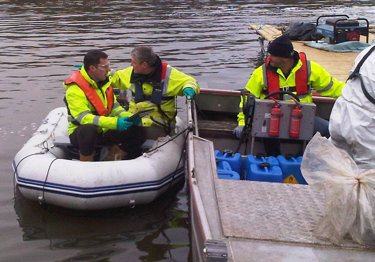
Aquatic ecologists
We help protect aquatic environments by assisting organisations to adhere to regulatory and statutory compliance relating to development and environmental incidents.
Assessing the status of the ecology in water bodies is essential in understanding the response of ecological systems to water quality and water quantity.
We provide Ecological Impact Assessments (EcIA) to help operations establish their impact on the aquatic environments in the event of incidents and to assist them with required mitigation.
We are also able to offer a range of assessments in relation to development including baseline surveys, EcIA, Habitats Regulation Assessments (HRA) and Water Framework Directive (WFD) assessments. All surveys and assessments are designed to ensure development minimises adverse impact to the ecology of nearby water bodies.
Our experts are also specialists in Biodiversity Net Gain (BNG), drought plan monitoring, fish passage capability and support, and providing an in-depth understanding of all aquatic invasive species or ‘species of concern’.
Added value
Expertise
Knowledge
Capability
Legislation
Our aquatic ecologists are well versed in key legislation to ensure you remain compliant. Relevant legislation includes:
Salmon and Freshwater Fisheries Act 1975
The Salmon and Freshwater Fisheries Act 1975 covers the regulation of fisheries in England and Wales, including the introduction of polluting effluents to waters.
Under this act any person who causes or knowingly permits to flow, or puts or knowingly permits to be put, into any waters containing fish or into any tributaries of waters containing fish, any liquid or solid matter to such an extent as to cause the waters to be poisonous or injurious to fish or the spawning grounds, spawn or food of fish, shall be guilty of an offence.
The Water Environment (Water Framework Directive) (England and Wales) Regulations 2003
The purpose of The Water Environment (Water Framework Directive) (England and Wales) Regulations 2003 is to establish a framework for the protection of inland surface waters (rivers and lakes), transitional waters (estuaries), coastal waters and groundwater, and for water all WFD waterbodies (unless artificial or heavily modified) to achieve good status, in terms of ecological and chemical quality and water quantity as appropriate.
Under these regulations, there is a duty on development consent decision makers to refuse consent where an activity is assessed to cause or contribute to a deterioration of a water body’s WFD status or jeopardise the water body achieving good status.
Experienced aquatic ecologists assess a wide range of ecological indicators including fish, aquatic macro-invertebrates, macrophytes and diatoms. We provide an integrated approach, linking the aquatic ecology to habitat availability, flow, and water quality and environmental perturbations.
Our services include:
- Routine and investigative monitoring
- Post-pollution assessments
- Fish population surveys and detailed data analysis
- Sampling, analysis, and interpretation of macro-invertebrate samples using BMWP scoring and other metrics
- Classification of macro-invertebrate samples using RICT
- Macrophyte surveys and data analyses using LEAFPACS2
- Sampling, analysis, and interpretation of diatom samples for Trophic Diatom Index (TDI) following DARES/DALES
- River Condition Assessments for BNG calculations
- Impingement and entrainment monitoring of water abstractions
Aquatic emergencies
The Environment Agency use The Common Instant Classification Scheme to grade the severity of an incident based on the impact to aquatic ecology. We gather evidence on behalf of our clients to demonstrate they are taking the aquatic ecology seriously and to challenge the classification, thereby impacting the level of fine levied.
We are experienced in dealing with environmental emergencies and disease outbreaks and can quickly respond to assess the risks to aquatic life, providing pollution impact assessments, fish mortality surveys, and hydrogen peroxide dosing to remediate and restore affected waterbodies in an emergency.
For aquatic emergencies we operate a 24-7 incident response hotline on: 0333 600 2424.

Mechanical and chemical aeration
Mechanical and chemical aeration to return oxygen to polluted waterbodies.
Invasive non-native species
Invasive Non-Native Species (INNS) or ‘species of concern’ are typically identified in surveys and reported on for development to minimise the risk of spread. Our specialists will help you design and implement biosecurity plans and invasive species management plans ensuring you remain compliant with relevant legislation.
Drought plan monitoring
British rivers are at risk of losing more than half their water by 2050, as cities in the UK face growing risks from drought driven by climate change.
As well as the impact on human health, water scarcity is likely to impact on aquatic ecosystems. Our experts can collect baseline data for your drought plans, provide environmental flow assessments, as well as helping you to assess the impact of removing more water.
Fish passage assessments
We can provide feasibility studies and assessments of barriers to determine the best option for providing fish passage in a range of situations.
Providing free and unhindered fish passage is a major objective of the Water Framework Directive (WFD) in achieving good ecological status. It is also important in the context of Eel Regulations which gives the Environment Agency additional powers to require screening of abstraction intakes and outfalls.
You might also be interested in...
Keep your business compliant and protect the environment while reducing the risk of operational downtime
Find out how Adler and Allan reduce your risk and support you on your journey to Net-Zero through the management and maintenance of assets.
Contact our experts




